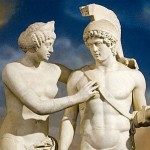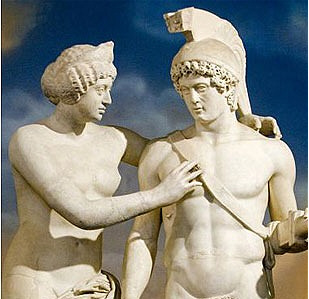
I was asked this weekend in a private email about the extent that Epicureanism could be thought of as having a “mystic” element. There are several citations in Norman DeWitt’s
Epicurus and His Philosophy of relevance to this:
- “He (Epicurus) may have enjoyed more the regular Dionysiac festivals, because his tastes were musical. It may have been that the Eleusianian mysteries impressed him deeply, especially those of the early autumn.” –Chapter 2 Samos and Athens, Section-Cadetship in Athens, paragraph 8
- “Adults would also have participated in the mystical nocturnal sessions, which took place at regular intervals.” Chapter 5 The New School in Athens, Section-Personnel and Students, paragraph 5
- “The Romans knew only an attenuated version of Epicurean fellowship. They were not mystics.” Chapter 5, Section – Friendship, paragraph 6
In my view, the Epicurean analysis of any issue related to gods or mysticism has to incorporate an order of reasoning such as the following:
1. Men have no means of knowledge except for the “canon of truth” (the five senses, the pain/pleasure mechanism, and the anticipations).
2. Individual perceptions are subject to the limitation that viewing conditions may hinder our having a clear view, and thus we must beware that perceptions may appear to be in conflict. The appearance of conflict is an illusion, however, and information derived from the five senses, the feelings, and the anticipations cannot be interpreted to be conflicting so as to lead us to adopt conflicting conclusions. Apparent contradictions in the evidence must be reconciled by multiple observations.
3. Until multiple observations are sufficient to provide clear evidence, it is absolutely fatal to consider speculations — especially in the field of religion, or of philosophies which elevate “reason” over the senses — to override a clear conclusion established by clear sensations. Just as with the tower at which at a distance appears round but when up close is seen to be square, where evidence conflicts or is insufficient we must “wait” before allowing ourselves to jump to a conclusion.
4. Our foundational observations about the nature of the universe are that we clearly see that nothing comes from nothing and nothing goes to nothing. From these we conclude that the universe is eternal.
5. We also observe that nothing exists except matter (atoms) and void. Today we would observe that the word “atom” simply means indivisible. Epicurus was not taking a position on whether molecules or atoms or protons or subatomic particles are the ultimate constituent of the universe, he was simply observing that at some basic level of division there is a stopping point. Fundamental elements cannot be divided infinitely.
6. Because of the above we hold it to be true that there is absolutely no “supernatural” dimension inhabited by supernatural creatures.
7. In regard to whether there are higher forms of life, however, we can make several observations. We know, for example, that Nature never creates only ONE thing of a single kind. Thus we conclude as did Lucretius that there are boundless numbers of other worlds in the universe with other races of living beings.
8. Because we hold that the universe is infinitely old we would expect that because of our conclusion in (7), and because of our observation that an infinite time has already passed by, there are boundless numbers of other worlds in the universe with other races of animals and men. Some of these are presumably more advanced than we are. There is also a doctrine preserved in the texts that because there are X number of “imperfect” beings in the universe there are also X number of “perfect” beings.
9. In addition to (7) and (8) we observe that among the “Anticipations” with which men are endowed by Nature is the anticipation that perfect and immortal beings exist which are blissfully happy, need nothing, and neither reward us nor punish us, to the extent we even come to their attention.
10. In summary of observations (7), (8) and (9), we conclude that perfect and immortal beings exist in the universe. These perfect and immortal beings may be called “gods,” but they are certainly NOT “all-powerful” and certainly NOT “creators of the universe.”
11. Returning to physics for a moment, we recall that the senses work in part by detecting “images” that all things omit and which travel through space. These images explain vision and other experiences, such as dreams, and even (perhaps) mental impressions. All things give off images, and so do any gods that exist. Epicurus seems to say that it is possible under certain conditions for men to perceive these images, and that men find the images of gods to be particularly pleasing to observe. It is possible that this is mainly a description of observing the beauties of Nature, but visions of gods themselves would be considered to be possible. Any such visions, however, would be subject to the limitations of what we know about the character of the gods, especially the rule that they are blessed and perfect and unconcerned with human affairs. Thus we emphatically rule out the possibility of gods handing down gold tablets from the tops of mountains, parting oceans, giving us instructions on what to do or not do with our lives, or committing any number of other so-called miracles!
12. Men are part of the Natural order of things – higher than many forms of life, but lower than others, including “the gods.” It is crucial that we remain aware of this Natural order. The universe as a whole, and the higher forms of life (including the gods), have a “majesty” about them that is pleasing to us and helpful for us to observe and incorporate into our thoughts and actions. Men have limited knowledge and will never understand all the aspects of that majesty, any more than a dog will understand its master’s instruction or its own nature. Our job is simply to respect and honor the Nature of things. At the same time that we respect and honor Nature, we should show gratitude to Nature for our place in the universe, and for the fact that in the vast sea of time and eternity we are indeed alive for the moment. Within the life we hold, Nature has provided that what is good is easy to get, and what is bad is easy to avoid. The eternity of non-existence ahead of us is quite a long time, so while we live we ought to revere Nature. This feeling of reverence could be considered similar to the experience that some people mean when they use words like “worshipful” or “reverential” — or even “mystical” — so long as those words are never allowed to include any falsehoods about the nature of the gods. Recall these words from Book II of De Rerum Natura (Humphries version):
Let a man
Call upon Neptune, if he likes, say Ceres
When he means corn or wheat, miscall his wine
By an apostrophe to Father Bacchus,
Let him keep on repeating that our globe
Is the gods’ mother – but let him, all this while,
Be careful, really, not to let religion
Infect, pollute, corrupt him.
Ceremonies, monthly observations of the Twentieth in honor of Epicurus, portraits, rings, cups, artwork, etc., are all useful devices for reminding ourselves about these aspects of the universe. Such methods may seem to some like crossing over into “mysticism,” but this would not be true. Recall the opening of Book I of De Rerum Natura. The lengthy “hymn to Venus” is often considered un-Epicurean, but the above observations support the view that it is our own misunderstanding, not Lucretius, which is to blame for the confusion. It is not un-Epicurean to hold firmly to the view that gods exist. It is not un-Epicurean to personify Nature by considering a goddess of love (Venus) to be the driving force of all living things. It is not un-Epicurean to consider, as in the opening of Book VI, that we are able to receive beneficent images of the gods if we simply understand their true Nature.
Some argue that these kind of references were either (1) a “sugar-coating” to appeal to the common people enamored with mythology or (2) a protective device to protect the Epicureans from being labeled as atheists and persecuted under anti-atheism laws. Both arguments suffer from the fatal flaw of failing to take seriously the whole of Epicurean theory. It is not a sound objection to say that Epicurean allusions to the gods are vague or overly-broad; instead, they are best viewed as the logical conclusions of Epicurus’ “rules of evidence.” In compliance with those rules, Epicurean observations about the gods go further than the evidence allows, but the fact that they are limited in scope takes nothing from the seriousness and earnestness with which they were held.
 I was asked this weekend in a private email about the extent that Epicureanism could be thought of as having a “mystic” element. There are several citations in Norman DeWitt’s Epicurus and His Philosophy of relevance to this:
I was asked this weekend in a private email about the extent that Epicureanism could be thought of as having a “mystic” element. There are several citations in Norman DeWitt’s Epicurus and His Philosophy of relevance to this:
